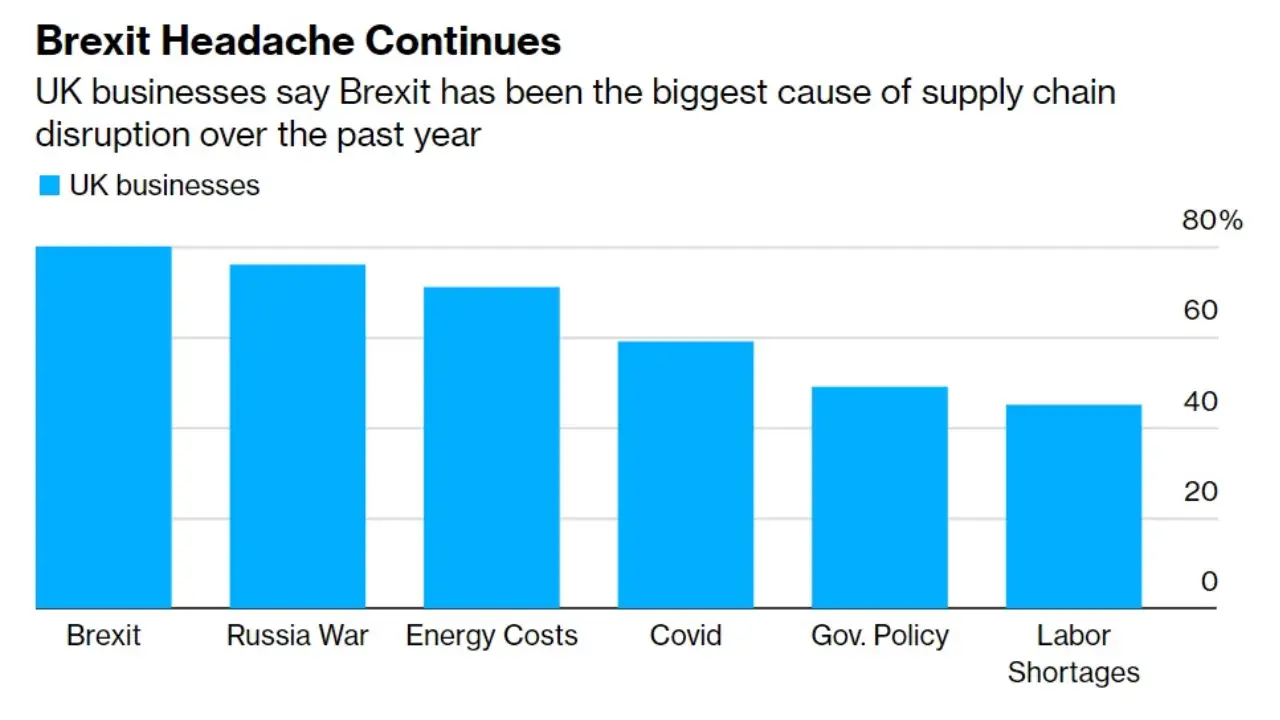Brexit has profoundly affected UK supply chains, introducing significant disruptions and requiring businesses to adapt to new realities. This blog explores the Brexit impact on supply chains operations, focusing on the impact of Brexit on UK supply chain structures and the strategies needed to navigate the Brexit supply chain disruption effectively.
Modelling by economists at Aston University has estimated that annual exports to the EU are 17 per cent lower and imports 23 per cent behind where they would have been if Brexit had not occurred, with negative impacts increasing during 2023.- Financial Times

Brexit Impact on Supply Chains:
Brexit has fundamentally reshaped the landscape of UK supply chains, bringing about significant challenges that businesses must navigate.
1. Increased Costs and Regulatory Complexity
The introduction of new tariffs, customs checks, and regulatory requirements has led to higher operational costs for businesses. According to McKinsey, 70% of UK companies have reported increased supply chain costs directly related to these new regulations. The complexity of navigating new trade agreements and ensuring compliance has also added a substantial operational burden. Businesses must now allocate additional resources to manage these complexities, including hiring specialized compliance staff or investing in legal services to ensure adherence to the new rules.
- Impact: These regulatory changes have created friction in the movement of goods, leading to longer lead times and increased administrative work. This has strained the profitability of many companies, particularly those that rely heavily on just-in-time (JIT) inventory systems.
- Example: A manufacturer importing raw materials from the EU now faces additional costs and delays due to customs checks and tariffs, impacting their production timelines and costs.
2. Supply Chain Disruptions
The Brexit impact on supply chain has been particularly severe in the form of disruptions. These include delays at borders, shortages of key materials, and increased lead times. McKinsey reports that 50% of UK companies have experienced significant delays, with customs procedures extending delivery timelines by an average of 30%. These disruptions have forced businesses to rethink their supply chain strategies, emphasizing the need for greater resilience.
- Impact: These disruptions have affected sectors across the board, from automotive to consumer goods, leading to missed deadlines, stakeouts, and, in some cases, lost business.
- Example: Retailers relying on timely deliveries from European suppliers have had to deal with unexpected delays, resulting in empty shelves and dissatisfied customers.
3. Workforce Shortages
Brexit has also exacerbated workforce shortages, particularly in sectors such as logistics and manufacturing, where the reduction in EU workers has had a significant impact. According to a Financial Times survey, 45% of logistics companies report difficulties in filling roles, which has directly affected their ability to maintain efficient operations.
- Impact: The shortage of skilled labor has increased operational challenges, leading to lower productivity and higher labor costs as companies compete for a smaller pool of workers.
- Example: A logistics company struggling to find drivers and warehouse staff may face delays in moving goods through the supply chain, exacerbating delivery delays.
4. Strategic Sourcing and Supplier Relationships
The Brexit impact on supply chain in UK has made strategic sourcing and supplier relationship management more critical than ever. With new trade barriers in place, companies are finding it necessary to diversify their supply bases and build stronger, more collaborative relationships with suppliers to ensure supply chain continuity.
- Impact: Companies that previously relied on a few key suppliers from the EU are now seeking to establish relationships with suppliers in other regions to mitigate risks.
- Example: A UK-based electronics manufacturer may shift some of its component sourcing to Asia or North America to reduce dependency on EU suppliers.
5. Logistical Challenges
Brexit has introduced new logistical challenges, particularly related to increased border checks and customs procedures. These challenges have created bottlenecks, leading to delays in the transportation of goods across borders.
- Impact: Logistical delays have increased costs and decreased the efficiency of supply chains, particularly for goods that require just-in-time delivery.
- Example: A company exporting perishable goods may experience delays at customs, leading to spoilage and financial losses.
These pre-Brexit impacts have reshaped the way UK businesses operate, forcing them to adapt their supply chain strategies to ensure they remain competitive and resilient in this new environment.
Post-Brexit Strategies for Supply Chain Resilience
1. Diversification of Supply Chains
Brexit-induced disruptions have highlighted the need to diversify supply sources across different regions, reducing dependency on the EU. By expanding your supplier base globally, you can build a more resilient supply chain.
- Actionable Insight: Utilize Zycus’s Supplier Management tools to identify new suppliers, assess risks, and manage relationships effectively, ensuring a flexible and diversified supply network.
2. Investment in Technology
To manage the complexities of the post-Brexit supply chain, businesses should invest in technology that automates compliance checks and streamlines logistics. Implementing digital tools reduces the risk of delays and helps maintain compliance with new regulations.
- Actionable Insight: Implement Zycus’s e-Procurement platform to enhance operational efficiency, ensure real-time compliance, and optimize logistics across your supply chain.
3. Strengthening Supplier Relationships
In the post-Brexit supply chain environment, fostering strong supplier relationships is crucial. Long-term partnerships provide stability and can secure more favorable terms.
- Actionable Insight: Leverage Zycus’s Strategic Sourcing tools to negotiate effectively, enhance collaboration, and build long-term relationships with key suppliers, ensuring consistent supply.
4. Exploring New Markets
Given the increased costs associated with EU trade, exploring markets beyond Europe is essential. This strategy not only offsets Brexit-related costs but also opens new opportunities for growth.
- Actionable Insight: Use Zycus’s analytics tools to identify emerging markets with favorable trade agreements, allowing your business to diversify its market presence and reduce reliance on the EU.
5. Workforce Development
Addressing workforce shortages requires a focus on upskilling and automation. Investing in training programs ensures your team is equipped to handle the demands of the post-Brexit supply chain.
- Actionable Insight: Incorporate Zycus’s workforce planning solutions to identify skills gaps, implement targeted training, and explore automation to maintain operational efficiency amidst workforce challenges.
Conclusion
Brexit has significantly impacted UK supply chains, but by adopting strategic adaptations, businesses can navigate these challenges and build more resilient, efficient supply chains. From diversifying suppliers to investing in technology and workforce development, these strategies will help businesses thrive in the post-Brexit supply chain landscape.
To learn how Zycus can support your supply chain strategies, schedule a demo with a Zycus product specialist today!
Related Reads:
- Zycus’s Predictions of GenAI in Procurement: Empowering the Future Today
- Leveraging GenAI for Smarter Contract Negotiation and Risk Management
- Whitepaper: 7 Intelligent Steps of Spend Data Aggregation & Analysis with GenAI: For Maximum Cost Savings
- Whitepaper: The CPO’s Guide to Mastering Generative AI in Procurement
- eBook: 10X Source to Pay with GenAI
- Redefining the Procure to pay Lifecycle with GenAI
- Embracing Analytics with GenAI: A Procurement Revolution in the Making
- Procure to Pay Consulting: How Generative AI is Transforming Advisory Services
- Challenges for GenAI Adoption in Procurement: Ethics, Data, & Security
- eBook: Strategic GenAI Adoption- A Blueprint for Modern Procurement Leaders




























































